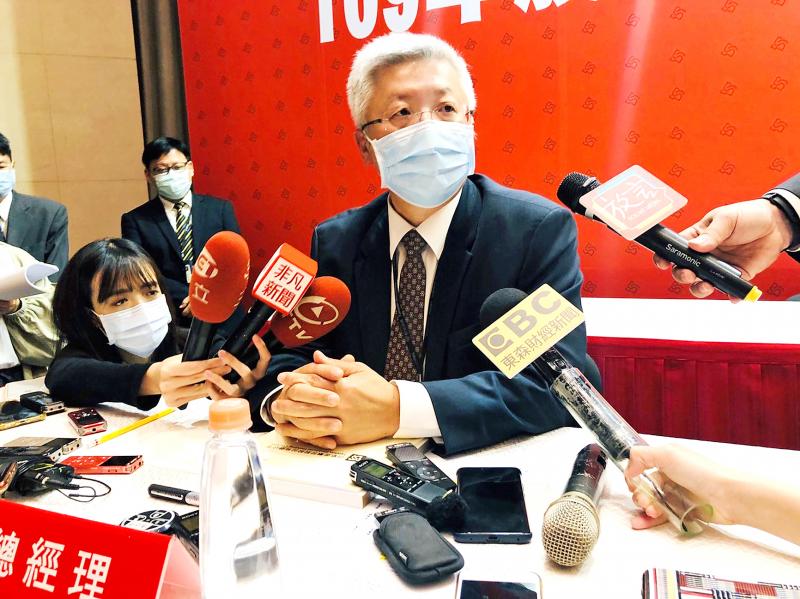Taishin Financial Holding Co Ltd (台新金控) yesterday asked the Ministry of Finance to let it take over state-run Chang Hwa Bank (CHB, 彰化銀行), and end their legal dispute over the management of the bank, Taishin chairman Thomas Wu (吳東亮) told a shareholders’ conference in Taipei.
Wu made the remark after CHB shareholders said they were concerned about the position Taishin would take on CHB’s board during its shareholders’ meeting next week.
The conglomerate has been contesting the ministry’s right to manage CHB since 2014, when it lost a majority on the CHB board to the ministry, as the ministry had in 2005 agreed that Taishin should keep the rights.

Photo: Kelson Wang, Taipei Times
“Although the Supreme Court has not yet made a judgement, the Taipei District Court’s ruling in 2016 established the validity of a contract between us and the ministry signed in 2005,” Wu said.
The district court’s verdict laid the foundation for the company’s continued efforts to regain control of the state-run lender, Wu said.
However, Wu said that he had no intention to make an enemy of the government, and Taishin is willing to settle the issue through negotiations on the premise that all shareholders’ right should be guaranteed, if the government aims to gain full control of CHB.
Meanwhile, Taishin Financial president Welch Lin (林維俊) yesterday said that a CHB statement in English that the ministry did a better job running the bank from 2014 to last year than Taishin did from 2005 to 2013 in terms of return on assets and return on equity (ROE) was not true.
“The claim is wrong, as it purposely ignored that we had to write off bad loans to reduce CHB’s nonperforming loan ratio after taking over, because the bank’s financial strength deteriorated when the ministry managed it before 2005.” Lin said.
“For example, we wrote off NT$59.6 billion [US$2 billion] in 2005, a high amount for a single year,” Lin said.
Lin said that CHB’s statement deceived foreign investors, misleading them into believing that the ministry would be a better owner, so it could gain their support.
Taishin did a good job running CHB, given that its average ROE was 11.6 percent from 2006 to 2014, higher than all banks’ average of 6.6 percent during the same period, Lin said.
By comparison, CHB’s average ROE fell to 9.96 percent from 2015 to last year, when the ministry owned the bank, while all Taiwan banks saw their average ROE recover to 9.5 percent, he added.

In Italy’s storied gold-making hubs, jewelers are reworking their designs to trim gold content as they race to blunt the effect of record prices and appeal to shoppers watching their budgets. Gold prices hit a record high on Thursday, surging near US$5,600 an ounce, more than double a year ago as geopolitical concerns and jitters over trade pushed investors toward the safe-haven asset. The rally is putting undue pressure on small artisans as they face mounting demands from customers, including international brands, to produce cheaper items, from signature pieces to wedding rings, according to interviews with four independent jewelers in Italy’s main

Japanese Prime Minister Sanae Takaichi has talked up the benefits of a weaker yen in a campaign speech, adopting a tone at odds with her finance ministry, which has refused to rule out any options to counter excessive foreign exchange volatility. Takaichi later softened her stance, saying she did not have a preference for the yen’s direction. “People say the weak yen is bad right now, but for export industries, it’s a major opportunity,” Takaichi said on Saturday at a rally for Liberal Democratic Party candidate Daishiro Yamagiwa in Kanagawa Prefecture ahead of a snap election on Sunday. “Whether it’s selling food or

CONCERNS: Tech companies investing in AI businesses that purchase their products have raised questions among investors that they are artificially propping up demand Nvidia Corp chief executive officer Jensen Huang (黃仁勳) on Saturday said that the company would be participating in OpenAI’s latest funding round, describing it as potentially “the largest investment we’ve ever made.” “We will invest a great deal of money,” Huang told reporters while visiting Taipei. “I believe in OpenAI. The work that they do is incredible. They’re one of the most consequential companies of our time.” Huang did not say exactly how much Nvidia might contribute, but described the investment as “huge.” “Let Sam announce how much he’s going to raise — it’s for him to decide,” Huang said, referring to OpenAI

The global server market is expected to grow 12.8 percent annually this year, with artificial intelligence (AI) servers projected to account for 16.5 percent, driven by continued investment in AI infrastructure by major cloud service providers (CSPs), market researcher TrendForce Corp (集邦科技) said yesterday. Global AI server shipments this year are expected to increase 28 percent year-on-year to more than 2.7 million units, driven by sustained demand from CSPs and government sovereign cloud projects, TrendForce analyst Frank Kung (龔明德) told the Taipei Times. Demand for GPU-based AI servers, including Nvidia Corp’s GB and Vera Rubin rack systems, is expected to remain high,